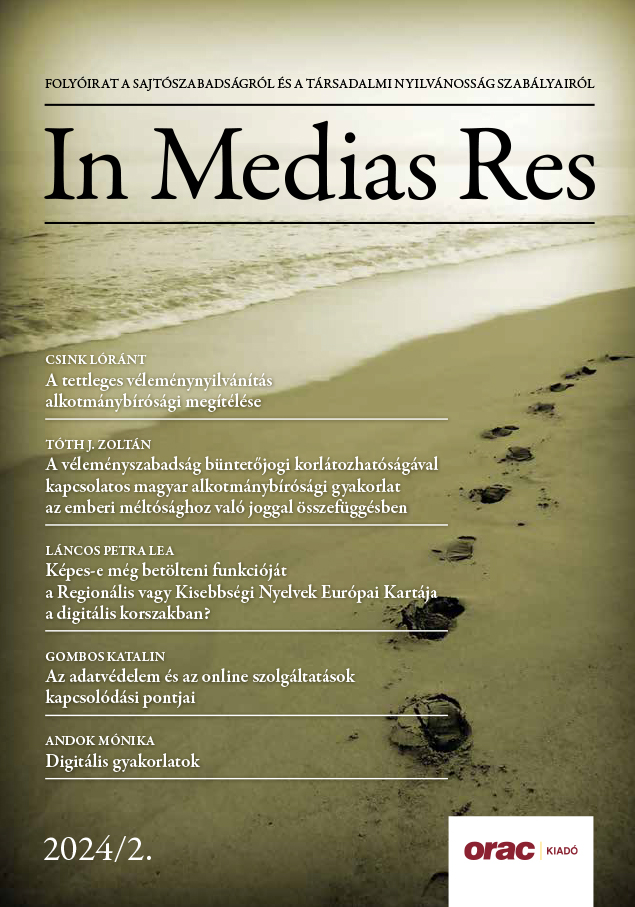Media tycoons in politics
DOI:
https://doi.org/10.59851/imr.13.2.11Keywords:
media tycoon, party, populism, media empireAbstract
Although there is a relatively wide literature of the success of new parties, of parties established by entrepreneurs, and of populist politicians, serious attention has not yet been drawn to the direct political engagement of persons with serious media empire (media tycoons). As case study or in other theoretical framework the cases of former Italian PM Silvio Berlusconi or former Czech PM Andrej Babiš have been researched, but the media tycoons’ attempts to enter the politics has been unexplored. This research aims at answering the question whether the existence of an own media empire is enough to enter the politics, and if it is not, what other factors are needed to do that. To achieve this goal, this study invokes the literature of entrepreneur parties, emergence of new parties and populism, examining three cases: the above-mentioned Italian and Czech examples and the – unsuccessful – attempt of Michael Bloomberg American media tycoon. Its conclusion is that owning media empire eases but does not grant the successful career in politics, however, it is not necessary for somebody to enter the politics from the business sphere. In the success, the image of the candidate, their characteristic, often populist messages and public appearances play a much greater role.
References
Arterton, Christopher F.: Teledemocracy: Can Technology Protect Democracy? Newbury Park, Sage, 1987.
Buštíková, Lenka – Guasti, Petra: The State as a Firm: Understanding the Autocratic Roots of Technocratic Populism. 33(2) East European Politics and Societies and Culture (2019) 302–330., https://doi.org/10.1177/0888325418791723
Campus, Donatella: Mediatization and Personalization of Politics in Italy and France: The Cases of Berlusconi and Sarkozy. 15(2) International Journal of Press/Politics (2010) 219–235., https://doi.org/10.1177/1940161209358762
Fabbrini, Sergio: The Rise and Fall of Silvio Berlusconi: Personalization of Politics and Its Limits. Comparative European Politics (2013) 153–171., https://doi.org/10.1057/cep.2012.18
Hanley, Seán – Vachudova, Mileda A.: Understanding the Illiberal Turn: Democratic Backsliding in the Czech Republic. 34(3) East European Politics (2018) 276–296., https://doi.org/10.1080/21599165.2018.1493457
Havlík, Vlastimil: The Economic Crisis in the Shadow of Political Crisis: The Rise of Party Populism in the Czech Republic. In Hanspeter Kriesi – Takis S. Pappas (szerk.): European Populism in the Shadow of the Great Recession. Colchester, ECPR, 2015, 199–216.
Hloušek, Vít – Kopeček, Lubomír – Vodová, Petra: The Rise of Entrepreneurial Parties in European Politics. Cham, Palgrave Macmillan, 2020., https://doi.org/10.1007/978-3-030-41916-5
Lucardie, Paul: Prophets, Purifiers and Prolocutors: Towards a Theory on the Emergence of New Parties. Party Politics (2000) 175–185., https://doi.org/10.1177/1354068800006002003
Mazzoleni, Gianpietro – Schulz, Winfried: Mediatization of Politics: A Challenge for Democracy. 16(3) Political Communication (1999) 247–261., https://doi.org/10.1080/105846099198613
McAllister, Ian: The Personalization of Politics. In Russell J. Dalton – Hans-Dieter Klingemann (szerk.): The Oxford Handbook of Political Behavior. Oxford, Oxford University Press, 2007, 571–588., https://doi.org/10.1093/oxfordhb/9780199270125.003.0030
Mudde, Cas – Rovira Kaltwasser, Cristóbal: Populism: A Very Short Introduction. Oxford, Oxford University Press, 2017., https://doi.org/10.1093/oxfordhb/9780198803560.013.1
Porro, Nicola – Russo, Pippo: Berlusconi and Other Matters: The Era of Football Politics. 5(3) Journal of Modern Italian Studies (2000) 348–370., https://doi.org/10.1080/13545710122655
Roberts, Andrew: Czech Billionaires as Politicians. 66(6) Problems of Post-Communism (2019) 434–444., https://doi.org/10.1080/10758216.2018.1490652
Sikk, Allan: Newness as a Winning Formula for New Political Parties. Party Politics (2012) 465–486., https://doi.org/10.1177/1354068810389631
Stewart, Jared A.: In Through the Out Door: Examining the Use of Outsider Appeals in Presidential Debates. 48(1) Presidential Studies Quarterly (2018) 93–109., https://doi.org/10.1111/psq.12433
Downloads
Published
How to Cite
Issue
Section
License
Copyright (c) 2024 József Dúró

This work is licensed under a Creative Commons Attribution 4.0 International License.


